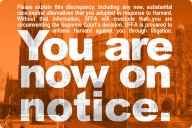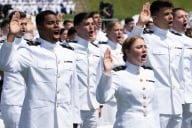You have /5 articles left.
Sign up for a free account or log in.

Hamilton College
Student workers in Hamilton College's admissions office announced in August that they had petitioned the National Labor Relations Board to unionize.
The NLRB counted the votes yesterday, and the students won, 25 to 20. (Some members of the union didn't vote.) While the union is a small one, it is significant. It is the first win by undergraduates seeking to unionize since the NLRB in March revoked a Trump administration rule that made them ineligible for collective bargaining. It is also the first union specifically for a college admissions office.
The bargaining unit includes tour guides and admissions fellows, who interview prospective students.
“I am always excited for a first-time election, and to make history is amazing,” said Frank C. DeRiso, president of United Food and Commercial Workers Local One, through which the students organized.
Hamilton issued a statement on the new union after the vote was announced.
"The National Labor Relations Board has counted the ballots and a majority of those admission student workers who voted selected union representation," the statement said. "Hamilton supports the right of workers to choose what they believe is best for them. We recognize that there were strong opinions on both sides of this issue, and we encourage everyone to work together as we move forward. As always, Hamilton greatly appreciates all of the hard work and dedication that our student employees bring to the jobs they perform while pursuing their academic careers."
While that statement was accepting of the union, and Hamilton plans to negotiate a contract, Hamilton gave the students information to discourage unionization.
An FAQ posted by the university said, "Students who work at Hamilton College have always had a direct relationship with the college as their employer, in addition to their academic relationship. Each student worker and each supervisor or manager can freely communicate with one another about any issue at any time, work together to address workplace issues and develop individualized arrangements. In a unionized work environment, the direct employment relationship between each student worker and the college would be replaced by a legal bargaining relationship between the college and the external labor organization, in this case UFCW Local One. The college would be legally prohibited from dealing with student workers directly over any terms and conditions of employment. The union would negotiate a one-size-fits-all collective bargaining agreement between the UFCW and the college governing the terms of employment. Union work environments are typically formalistic and rule-driven. The overall impact would likely be a work experience that is less personal and more transactional. Unions also require payment of dues."
As to wages, the FAQ said, "There is no guarantee of a wage increase, and there is no guarantee that the final contract would be better than what the student workers had before the union."
But more than 40 faculty members signed a letter in The Spectator, the student newspaper, saying that "a union empowers workers, through organizational resources, collective bargaining rules, and increased solidarity, to be able to seek better working conditions and protect themselves against not only employer malfeasance or abuse but also the capriciousness of employer responses to developments like COVID. Such protection is especially important for students from economically marginalized communities -- often first generation students or students of color -- who may often face a choice between accepting unfair or unsafe working conditions and losing essential income."
Union leaders said that many grievances motivated the drive for a union.
"Workers reported a number of concerns ranging from wage theft, being declined a pay raise, an unrespectful work environment, and being forced to give tours during heat advisories and other inclement weather-conditions," a union press release said. "Admissions also announced the return of in-person tours during spring 2021 without consulting tour guides."
Hamilton denied those charges.
"Is Hamilton permitted to talk with student workers about the union? Yes, it is perfectly acceptable to provide student workers with information, to articulate the college’s position on the issues, and to answer questions so students can make an informed decision. It would be a strange election process if only one side was allowed to express its views," Steve Stemkoski, director of human resources, said in a letter to The Spectator. "It has also been suggested that the college did not consult with tour guides before resuming tours last spring. This also is simply not true. The college did consult with the tour guides and offered those who were not comfortable conducting tours substitute work options."








